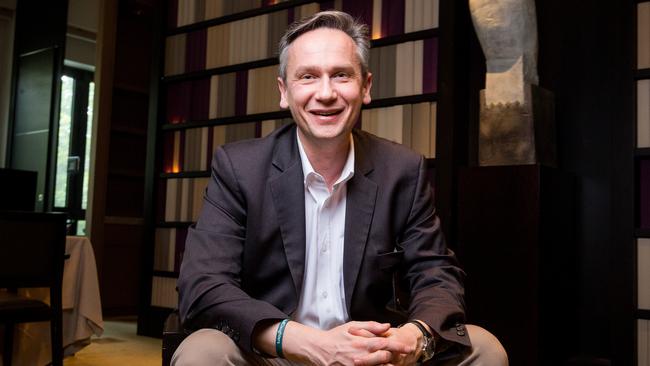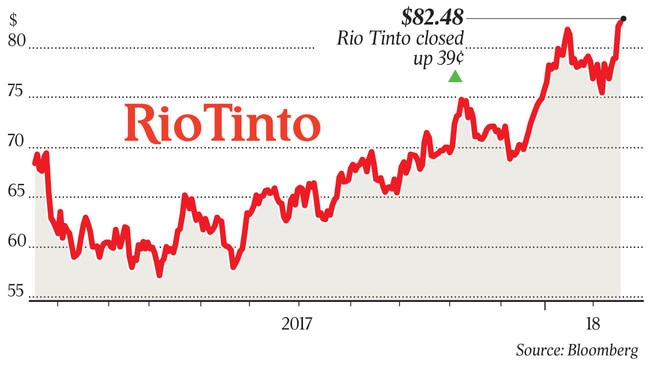Jean-Sebastien Jacques: Deals back on Rio Tinto agenda
Jean-Sebastien Jacques says productivity is still the name of the game but will now set a foundation to pursue M&A.

When Jean-Sebastien Jacques took the top role at Rio Tinto in 2016, the big miner was three years into a relentless round of cost-cutting and balance sheet repair.
Eighteen months later, productivity is still the name of the game. But it has been recast as a route to value growth through a simplified and streamlined asset base and a “value over volume” mantra.
Mr Jacques says productivity will also set a foundation to pursue mergers and acquisitions, by allowing Rio to extract greater value from whatever it may buy.
“The productivity agenda for me, when it was launched, was about driving the rerating of the share price by delivering cash returns in the short term and creating the platform for potential future growth through M&A, if it makes sense,” Mr Jacques told The Weekend Australian.
“If you have a strong model that creates better efficiencies, when you bring a new mine into the family you have new ways to create real symmetries.
“All the work we are doing in terms of technology, operating practices, automation, it is not only to improve our existing asset base, but it is having an engine, a machine, that will be able to create value as and when we find a good opportunity.”
Talk of acquisitions may unsettle investors who recall a company left nearly crippled during the global financial crisis because of its debt-fuelled $US40 billion takeover of Alcan.
It then completely wrote off $4bn of 2011 Mozambique coking coal assets purchased in 2011 and a $US570 million Canadian uranium takeover the same year.
So Mr Jacques is quick to stress Rio will have a very high threshold on value for any purchases.
“If we have to wait for many years until the next cycle to execute, we will,” he said.
“On M&A, I’m very patient.”
Mr Jacques was speaking in Sydney, where he was meeting investors during the week after earlier this month reporting a 69 per cent profit boost in 2017 profit to $US8.6bn, on the back of commodities price gains and the four-year productivity drive.
The profit, and years of balance-sheet repair, allowed for a record dividend and an extra $US1bn buyback, drawing a warm reception from shareholders who have now been given $US9.7bn of 2017 cash returns.
On top of this, global growth appears to be firing on all cylinders and China is adding to demand for Rio’s high-quality iron ore and coking coal through its environmental policies and could do the same for aluminium and copper. Apart from some industry-wide cost inflation starting to return, the mining outlook is strong. “We’ve got the momentum and I think what shareholders should expect from us is we’ll continue to keep our promises and to deliver spare cash to shareholders in the short, medium and long term,” Mr Jacques said.
Any growth spending, essential to a big miner, would have to be value-adding and would be pursued at a deliberately measured pace.
“Value over volume means it is better to focus on very few projects and deliver them very well than it is to pursue growth for the sake of it with lots of projects,” he said. “You can’t have the A-team on every one those projects, so then the outcome is not very good.”
He said he had no issue with Rio growing production at a slower rate than global GDP if it was high-quality growth.
“The intent is not to be the biggest, it is to be the smartest and the most profitable, the company that is admired for creating value for its shareholders,” he said.
When Mr Jacques took the reins from predecessor Sam Walsh, it was after a wholly necessary period of cost-cutting and capital restraint. The austerity followed the ill-disciplined acquisitions and a focus on massive expansions at the expense of costs, something that was evident in all the big miners during the China boom.
But by 2016, when Mr Jacques was appointed chief, the board was seeing signs of cost-cutting fatigue setting in.

Mr Jacques won’t comment on the impact of the post-boom cost-cutting on his employees.
But he says the workforce now appears to have more of a spring in its collective step, partly due to productivity measures and benchmarking designed to promote internal competition and sharing of ideas across the global group.
“The past is the past, but in the last six to nine months, we’ve started to see some pick-up in terms of positive energy across the company,” he said.
“When you go on site and see people say ‘we stole this idea from this site, or I have done benchmarking from that site’, you know you are on the right track.”
Boosting workforce pride is one of the reasons Rio is launching a brand and advertising campaign in Western Australia today that it will roll out to other parts of the country later in the year.
“It’s important for people, when they got to a barbecue, to be able to say I’m working for something that is meaningful and a company that is meaningful,” he said, adding he wanted to unleash more of the positive energy he is seeing.
Like BHP’s recent ad campaign, its main aim is to improve external perceptions of the company and the industry.
“It’s about explaining to people how we contribute to society above and beyond paying taxes, how we are building a community of suppliers, how we support diversity and things like the flying doctors,” he said.
“What we are trying to do is what we should have been doing for a long time: explain, in the 21st century, through Facebook, Twitter, what the contribution of the industry and Rio Tinto is.”
The predominantly digital campaign will be more low-key than BHP Billiton’s recent $10m-plus “Think Big” program that includes television ads and promotes BHP’s dropping of the word “Billiton” from its branding.
Rio’s campaign will highlight the work Rio does in the community, but not be “too Rio aggressive”, Mr Jacques said.

To join the conversation, please log in. Don't have an account? Register
Join the conversation, you are commenting as Logout